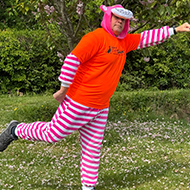BSAVA president to brave charity wing walk

BSAVA president Julian Hoad will be dressed in a full Cheshire cat onesie for his wing-walking challenge.
BSAVA president Julian Hoad is set to take to the skies in a daring charity wing walk for BSAVA PetSavers.
Julian, who will be donning a Cheshire cat onesie for the challenge, will secured to the top of a vintage biplane on Thursday, 29 May in Cirencester, Gloucestershire.
The bold adventure marks the end of Julian’s presidential year, and is all in the name of raising funds for BSAVA PetSaver’s groundbreaking research.
So far, the charity has invested over £2.7 million into diseases affecting companion animals, including cancer, heart conditions, gastrointestinal issues, neurological and joint disorders, and many more.
Reflecting on his challenge, Julian said: "Every day, vets face the heart-wrenching task of managing the distress and pain our pets suffer due to disease or poor health.
“With your support, we can ensure that they have access to the latest knowledge and resources needed to provide the best care possible.”
He added: “The need for advanced research is more pressing than ever and our pets deserve every chance at a healthy life. If dressing up as a cat and flying on the wing of a plane makes people take notice of the vital need for pet health research, then it will be worth it.”
Alison Selby, Fundraising Manager for BSAVA PetSavers said: “No one has ever been quite so daring in their fundraising efforts for us, so we are thrilled that Julian has decided to take this on to raise awareness and funds for BSAVA PetSavers.
“For every grant application that we fund, at least two or more are declined due to lack of funds. Fundraising events like this helps to land more funding in the hands of researchers who make a real difference in the veterinary community and directly impact the lives of countless pets and their families.”
At the time of writing, Julian has raised £524 of his £1,000 target. To donate to his challenge, visit his Just Giving page.



 The RCVS has announced a new version of its 1CPD mobile app, with enhanced features for veterinary surgeons and veterinary nurses to record their continuing professional development.
The RCVS has announced a new version of its 1CPD mobile app, with enhanced features for veterinary surgeons and veterinary nurses to record their continuing professional development.